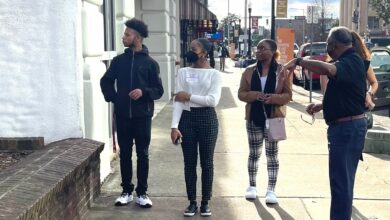60 Years After the Civil Rights Act, Equal Opportunity Is Under Attack

There’s too much at stake with constant assaults on civil rights — and a new report is calling on Black Americans to organize and “fight for the soul of America.”
The National Urban League’s State of Black America report comes just months ahead of the 60th anniversary of the Civil Rights Act of 1964, the landmark civil rights legislation that granted equal access to employment, voting rights, federal programs, and public accommodations.
Sixty years after the passage of the act, “we’re seeing the most aggressive effort to undercut the progress wrought” by conservatives and utilization of the courts, said Marc Morial, president of the National Urban League. For example, in 2022, the U.S. Supreme Court overturned Roe v. Wade, which protected the rights of abortion. Last summer, the Supreme Court struck down affirmative action in college admissions.
Experts say the decision paved the way for other attacks on programs and business geared toward Black people. Last fall, the American Alliance for Equal Rights, a conservative group, filed a lawsuit against the Fearless Fund — a Black woman-owned business that gives funding to other Black women businesses — claiming their program discriminates against people of other races.
Even the Small Business Administration had to halt its business development program targeted for socially disadvantaged applicants, or historically marginalized groups. A Tennessee federal judge ruled that the program can’t equate race with socially disadvantaged, which forced Black applicants to “prove that their races put them at a social disadvantage.”
This year’s report examines the impact of the Civil Rights Act of 1964, the resistance against racial justice, and the limited progress toward economic equality for Black Americans.
The act essentially outlawed Jim Crow, and gave Americans freedom to participate in the country’s democratic systems and political process, which have contributed to the increase in Black representation in local, state, and congressional offices. The law also laid the groundwork for other pivotal legislation, such as the Fair Housing Act of 1968 and Voting Rights Act of 1965, which has also been rolled back over the years.
Last year, the Eighth U.S. Circuit Court of Appeals decided that private plaintiffs, including civil rights groups, can’t sue under Section 2 of the Voting Rights Act, but the U.S. Department of Justice can. Of the at least 182 successful cases that have been brought under Section 2 of the Voting Rights Act over the past 40 years, just 15 have been brought solely by the DOJ.
This is only one of hundreds of examples of attempts to infringe on and dilute Black political power and the right to vote. While the percentage of Black Americans who registered to vote increased to 69% in 2020 from 64% in 2000, there’s still a lag in voter turnout — the percentage of Black people who voted in 2022 was 42.3%, down from 54% in 2002. The same is true for economic equality. According to the report, the median household income for Black people increased to $51,000 from $28,700 over two decades. However, Black men and women still, on average, earn less than their white counterparts.
Read more: An ‘Explosive Growth’ of Racial Violence and Extremism Is Endangering Black Americans
“Unquestionably, today’s America offers more opportunities for Black persons than existed in most of our past, but the virulence and persistence of employment discrimination against Black Americans and so many others is sobering evidence of the urgent need for continued progress,” Charlotte Burrows, chair of the U.S. Equal Employment Opportunity Commission, wrote in an essay for the report.
She added: “We cannot afford to take the law’s protections for granted or ignore the current threat posed by attacks on efforts to expand equal opportunity.”
So, how do you navigate the roadblocks in today’s sociopolitical climate?
The report calls for a third emancipation in this country’s history by “uprooting the deep racial divisions” embedded in our institutions. The authors demand that Congress pass legislation — such as the John Lewis Voting Rights Advancement Act, Child Tax Credit and Earned Income Tax Credit, and the George Floyd Justice in Policing Act — to strengthen voting rights, reduce poverty, and protect the safety of Black Americans, respectively.
On a community level, Morial noted that it requires more pressure, advocacy, and people involved in the fight to maximize voting and spending power.
“We’ve not really harmonized our ability to use our economic power on a collective basis because so many Black people spend most of their money on items of necessity to have to buy food, clothing and shelter,” Morial said. “What we do have is strategic political power, and we have to remain far more engaged and vocal about holding elected officials accountable.”
Source link
























































